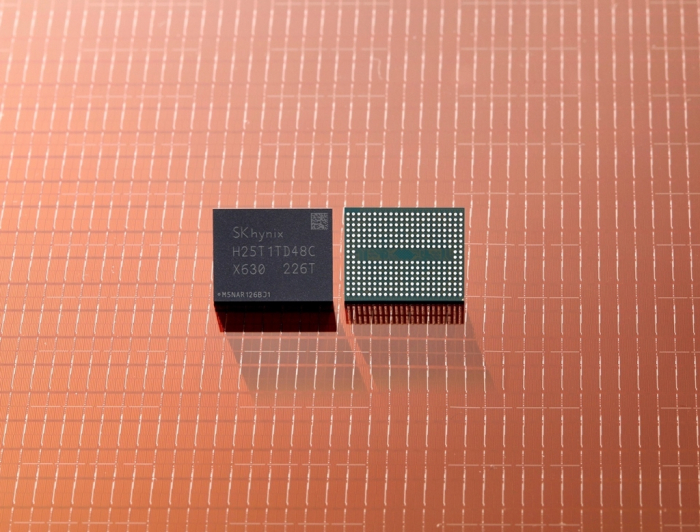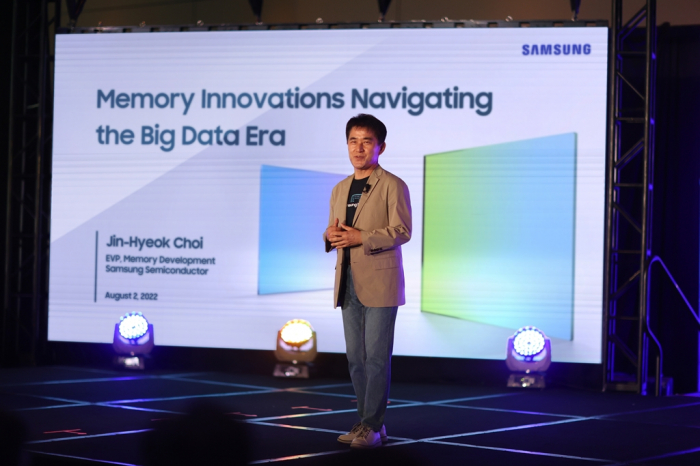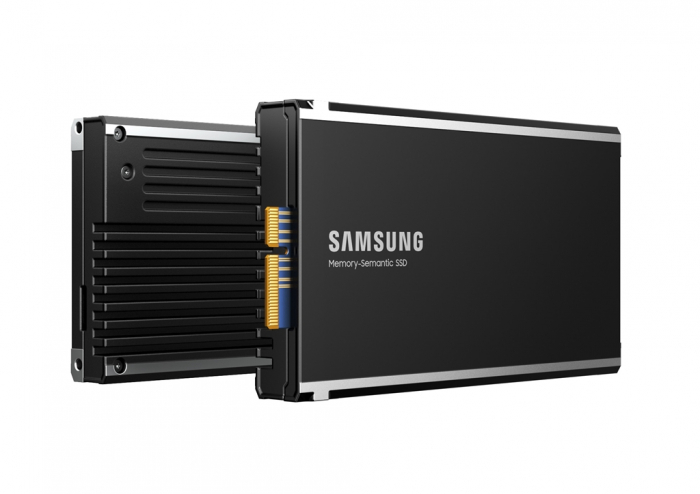Korean chipmakers
SK Hynix unveils world's first 238-layer NAND; Samsung SSD 20 times faster
The Korean chipmakers speed their transition to higher-density, faster chips to widen tech lead over rivals
By Aug 03, 2022 (Gmt+09:00)
3
Min read
Most Read
LG Chem to sell water filter business to Glenwood PE for $692 million


KT&G eyes overseas M&A after rejecting activist fund's offer


Kyobo Life poised to buy Japan’s SBI Group-owned savings bank


StockX in merger talks with Naver’s online reseller Kream


Meritz backs half of ex-manager’s $210 mn hedge fund



Samsung Electronics Co. and SK Hynix Inc., the world’s two largest memory chipmakers, are set to overtake their rivals in the industry’s transition to higher-density, faster semiconductors by unveiling new chips.
The two South Korean chipmakers have already acquired state-of-the-art technology to manufacture such chips, which will rush other chipmakers into unveiling their latest products, analysts said.
SK Hynix said on Wednesday it recently shipped samples of the industry’s highest density 238-layer, 512-gigabit (Gb) four-dimensional NAND chip to customers, with a plan to start mass production in the first half of 2023.
The latest achievement follows the company’s 176-layer NAND flash memory unveiled in December 2020.
“It is notable that our latest product is the industry’s most layered and at the same time smallest in size,” SK Hynix said while showcasing its chip at the Flash Memory Summit 2022 in Santa Clara, California.
Micron Technology Inc. said last month it has begun volume production of the world’s first 232-layer NAND chips.

“With this 238-layer NAND chip, we have secured the world’s top-tier competitiveness in terms of costs, performance and quality,” Choi Jung-dal, the company’s NAND development chief, said in his keynote speech.
SK Hynix said the new NAND chip boasts a data transfer speed of 2.4 Gb per second, a 50% improvement over its previous generation chip, which is 176-layer NAND. The chip also lowers energy consumption for data reading by 21%, the company said.
The chipmaker said it will use the newest chip in solid-state drives (SSDs) for PCs and expand its application to smartphones and other high-capacity devices later.
SK Hynix also plans to unveil 1 Terabit (Tb), 238-layer NAND product next year.
According to market researcher Omdia, SK Hynix, together with its affiliate Solidigm, the new name of Intel Corp.’s NAND business which SK acquired in 2020, held a combined 18.1% of the world’s NAND flash market as of the first quarter.
Samsung, which posted $6.3 billion in NAND sales in the first quarter, is the industry leader with a 35.5% market share, followed by Japan’s Kioxia Corp. with 19%.

SAMSUNG’S NEXT-GENERATION TECHNOLOGIES
At the Flash Memory Summit, Samsung showcased an array of its next-generation memory and storage technologies.
Among those unveiled by Samsung are a petabyte storage system and a memory-semantic SSD.
Samsung said its petabyte storage technology will be able to save 174,000 films worth of data in a device and consumes less power than its earlier storage systems.
Samsung’s memory-semantic SSD combines the benefits of storage and DRAM memory.
Leveraging Compute Express Link (CXL) interconnect technology and a built-in DRAM cache, the memory-semantic SSDs can achieve a 20-fold improvement in both random read speed and latency when used in artificial intelligence, machine learning (ML) and high-performance computing (HMC) applications, it said.
“The IT industry faces a new set of challenges brought on by the explosive growth in big data, and this underscores the importance of a robust, cross-industry ecosystem,” said Choi Jin-hyeok Choi, executive vice president of Memory Solution & Product Development at Samsung.
“We are committed to developing transformative memory technologies that can bring far-reaching changes in how we move, store, process and manage data for future AI, ML and HPC applications, as we navigate these challenging tides together with our industry partners.”
Write to Sungsu Bae and Ji-Eun Jeong at baebae@hankyung.com
In-Soo Nam edited this article.
More to Read
-
 Korean chipmakersSamsung, SK Hynix ahead of rivals in 200-plus-layer NAND chips
Korean chipmakersSamsung, SK Hynix ahead of rivals in 200-plus-layer NAND chipsFeb 04, 2022 (Gmt+09:00)
3 Min read -
 EarningsSamsung works on industry’s first 200-layer NAND as its Q2 profit jumps
EarningsSamsung works on industry’s first 200-layer NAND as its Q2 profit jumpsJul 29, 2021 (Gmt+09:00)
3 Min read -
 Korean chipmakersSK Hynix starts mass production of high-performance SSDs
Korean chipmakersSK Hynix starts mass production of high-performance SSDsApr 15, 2021 (Gmt+09:00)
1 Min read -
 Korean chipmakersNAND competition heats up as SK Hynix unveils 176-layer flash memory
Korean chipmakersNAND competition heats up as SK Hynix unveils 176-layer flash memoryDec 07, 2020 (Gmt+09:00)
3 Min read
Comment 0
LOG IN


